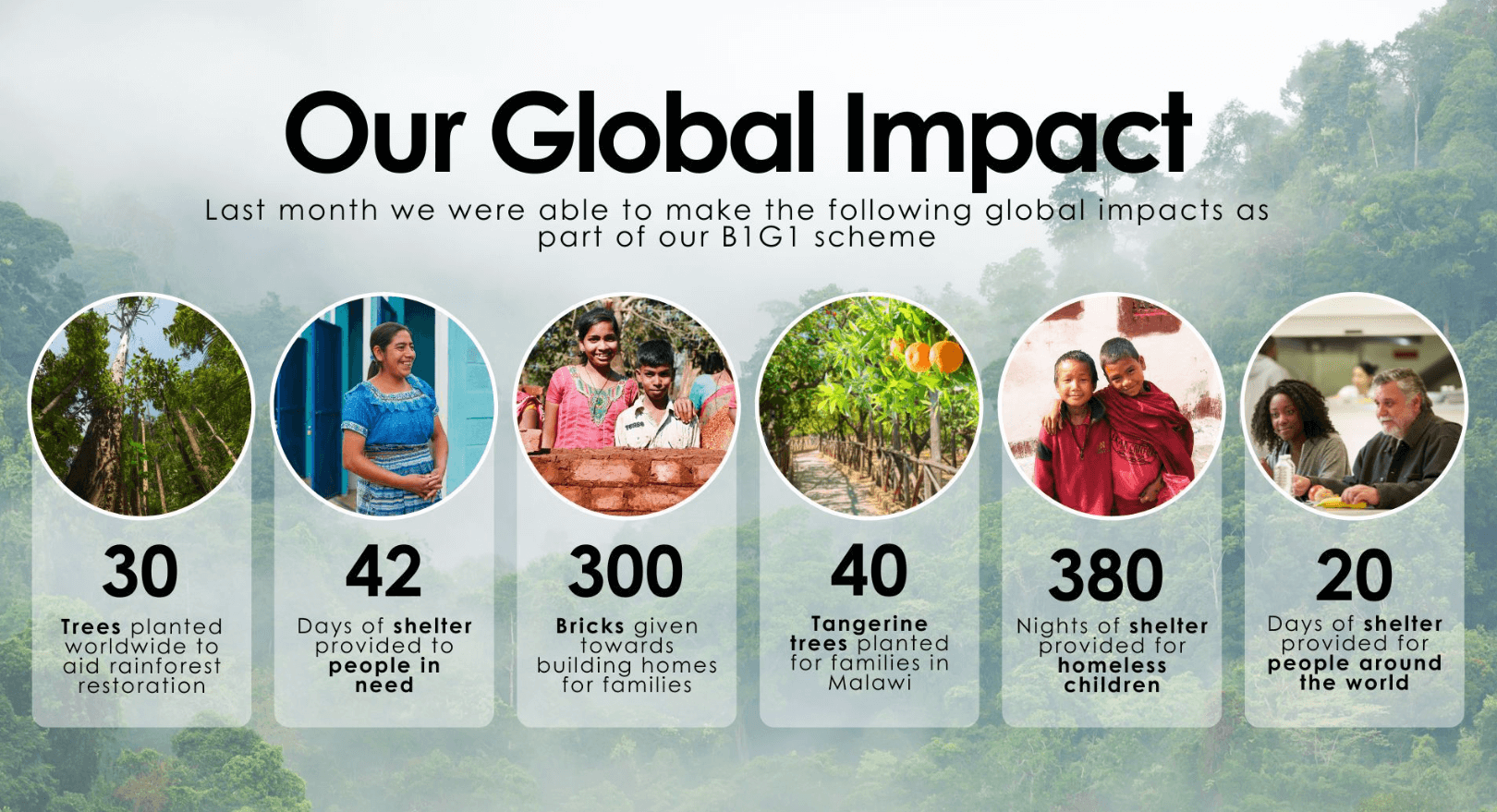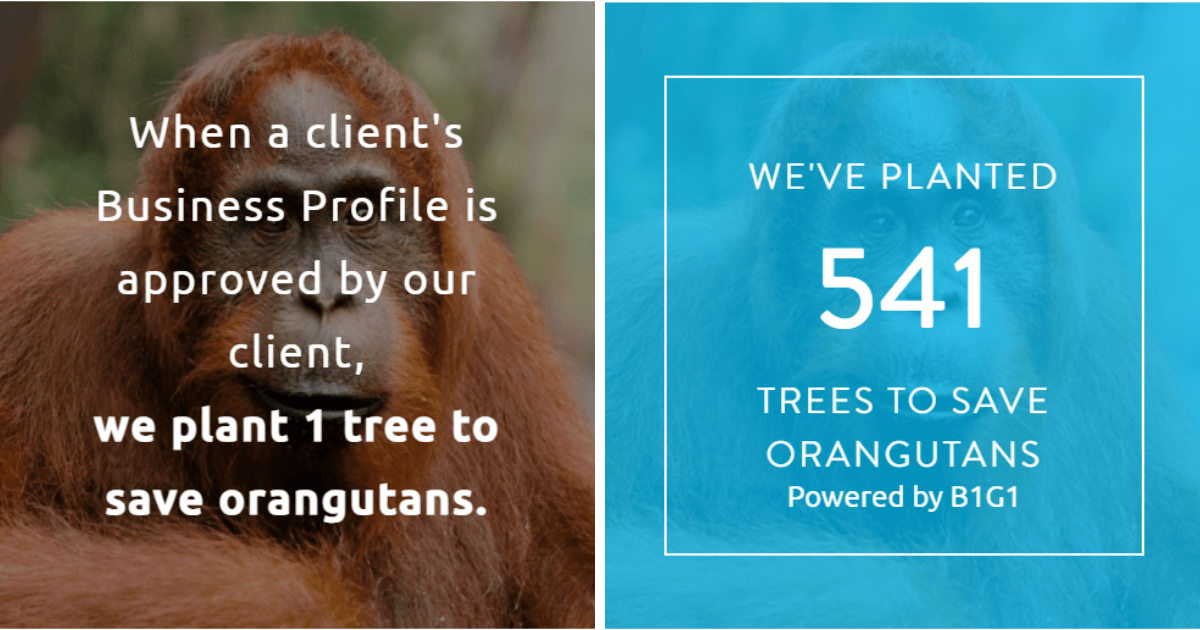People, Profit AND Planet — the way forward for us all.
Since recorded time, man has relied on nature to fulfill his most basic needs.
It used to be that people took only what was necessary to have food and shelter. But as mankind evolved, industries birthed, technology developed and the cost to the environment (our planet) increased.
Studies show that we use the equivalent of 1.6 Earths to maintain our current way of life. The natural ecosystems that exist just simply cannot keep up with our demands.
These statistics from the United Nations Environment Programme further underscore just how much natural resources people use and abuse.
- 75 percent of the Earth’s land surface has been significantly altered by human actions, including 85 percent of wetland areas. (IPBES)
- 66 percent of the ocean area is impacted by human activities, including fisheries and pollution. (IPBES)
- Close to 90% of the world’s marine fish stocks are fully exploited, overexploited, or depleted. (UNCTAD)
At B1G1, we recognize that everyone has the potential to be stewards — yes ‘stewards’ of our planet. Businesses more than any other entity on our planet can (and indeed must) lead the charge. Business leaders, beyond providing mere direction, can cultivate cultures of “purpose, connection, and responsibility”, causing their organizations to work towards achieving sustainable operations.
This blog post offers a closer look at the project categories specific to environmental causes. It also highlights three Businesses for Good that have chosen to make a difference in this area.
Environment-Focused Project Categories
WASTE REDUCTION
Embracing waste reduction practices can pave the way for cleaner surroundings and healthier communities. When we minimize waste production, we also reduce the strain on landfills and decrease pollution, leading to a more sustainable environment.
Waste reduction also comes with economic benefits through resource conservation. Ultimately, adopting these practices fosters a culture of environmental responsibility that benefits both current and future generations.
Here's a look at specific projects for Waste Reduction.
- RESCUE ONE MEAL FOR THE HOMELESS
- BUILD CLASSROOMS OF HOPE FROM RECYCLED PLASTIC WASTE
- RECYCLE HOTEL SOAP FOR HEALTHY CHILDREN AND A HEALTHY PLANET
TREES AND FOREST
Planting trees allows us to nurture green landscapes, fight climate change, and safeguard vital ecosystems for a greener tomorrow. The more trees there are, the better our chances of mitigating the effects of global warming and reducing our carbon footprint.
And yes, there’s so much more to be done NOW for carbon reduction than tree planting.
Nevertheless, sustainable forestry practices ensure that forests remain healthy and productive, providing habitat for wildlife and preserving biodiversity. These actions also help to maintain the balance of natural cycles, such as water regulation and soil conservation, which are essential for a stable environment.
The projects below allow businesses like yours to contribute to reforestation efforts all over the world.
- PLANT A TREE IN THE DAINTREE RAINFOREST
- SUPPORT A COMMUNITY-OPERATED TREE NURSERY
- PLANT TREES TO INCREASE FOREST COVER
LIFE BELOW WATER
Protected marine ecosystems result in thriving underwater life.
Healthy marine ecosystems support a diverse array of sea life, from the smallest plankton to the largest whales, contributing to biodiversity and resilience against environmental changes.
The benefits extend to human communities as well, as thriving marine ecosystems support fisheries, tourism, and coastal economies. By implementing measures to reduce pollution, overfishing, and habitat destruction, we create a healthier environment for marine species to flourish.
Here's a look at specific projects for Life Below Water.
- STOP ILLEGAL SHARK TRADING
- TRACK AND STUDY SALTWATER CROCODILES
- SPREAD AWARENESS FOR SEA TURTLE PROTECTION
LIFE ON LAND
Promoting biodiversity means maintaining the variety of species within an ecosystem, which enhances its resilience and productivity. Healthy, diverse ecosystems provide numerous benefits, including clean air and water, fertile soil, and the pollination of crops.
Additionally, preserving wildlife diversity safeguards genetic resources that could be crucial for scientific and medical advancements.
These are some specific projects for Life On Land.
- EDUCATE CHILDREN ON HEALTHY ENVIRONMENTAL PRACTICES
- PROVIDE RESCUED ANIMALS SHELTER FROM THE ELEMENTS
- TRAIN A FARMER IN REGENERATIVE FARMING
Businesses Doing Good
An interior design company that supports tree planting projects managed by B1G1 Worthy Causes. With every show-home installation or client servicing activity, BLOCC Interiors is able to plant tangerine trees in Malawi or provide days of shelter to people around the world that need it the most.

BONZA BUSINESS & FRANCHISE SALES
This Aussie Business for Good has a soft spot for orangutans as it supports projects for the preservation of this primate through habitat restoration.

A global team building services provider, this B1G1 member gives to several environment-focused projects including giving access to clean, life-saving water to children.
Catalyst Global offers specialized programs that empower clients to make a global impact through team-building activities. These programs not only foster team cohesion but also raise awareness among participants about the Sustainable Development Goals (SDGs).
MAKING EVERY DAY EARTH DAY
While the 22nd of April is known around the world as ‘Earth Day’, you and your team can show concern for the environment year-round. Instead of limiting your efforts to just one day, incorporate sustainable practices into your daily business activities.
Like the forward-thinking companies mentioned earlier, you too can harness the power of B1G1's Engagement tool to foster recurring positive impacts on the environment.
Use this tool to set up recurring impacts that are embedded into everyday business activities.
Join the Global Giving Movement today and make a lasting commitment to ensuring that every day is celebrated as Earth Day, creating a ripple effect of environmental stewardship and social responsibility.
